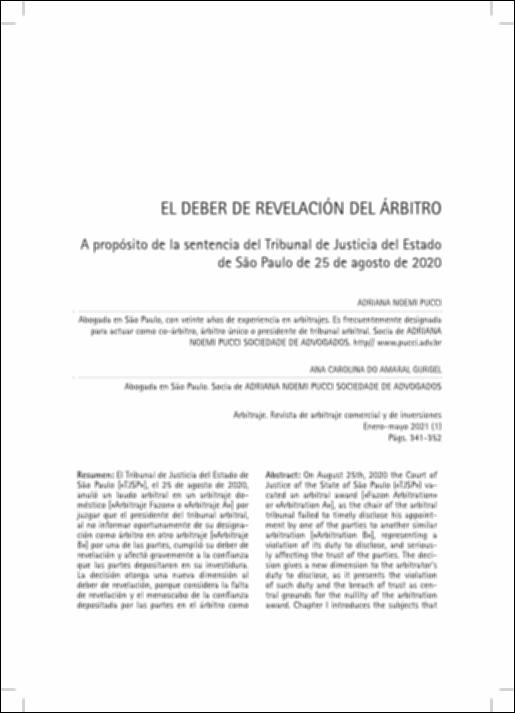Please use this identifier to cite or link to this item:
http://hdl.handle.net/10637/13631El deber de revelación del árbitro: a propósito de la sentencia del Tribunal de Justicia del Estado de Sao Paulo de 25 de agosto de 2020.
| Title: | El deber de revelación del árbitro: a propósito de la sentencia del Tribunal de Justicia del Estado de Sao Paulo de 25 de agosto de 2020. |
| Authors : | Pucci, Adriana Noemi Amaral Gurgel, Ana Carolina do |
| Keywords: | Deber de revelación.; Imparcialidad.; Confianza.; Ley de Arbitraje Brasileña (Ley 9– 306/96).; Nulidad del laudo arbitral.; Duty of disclosure.; Impartiality.; Trust.; Brazilian Arbitration Law (Law 9-306 / 96).; Vacation of the arbitration award. |
| Abstract: | El Tribunal de Justicia del Estado de
São Paulo ["TJSP"_], el 25 de agosto de 2020,
anuló un laudo arbitral en un arbitraje doméstico ["Arbitraje Fazon" o "Arbitraje A"_] por
juzgar que el presidente del tribunal arbitral,
al no informar oportunamente de su designación como árbitro en otro arbitraje ["Arbitraje
B"_] por una de las partes, cumplió su deber de
revelación y afectó gravemente a la confianza
que las partes depositaron en su investidura.
La decisión otorga una nueva dimensión al
deber de revelación, porque considera la falta
de revelación y el menoscabo de la confianza
depositada por las partes en el árbitro como situaciones que comprometen el debido proceso legal, que justifica la anulación del laudo
arbitral. En el Capítulo I, presentamos una introducción a los temas que serán analizados,
justificando la importancia de la decisión del
“TJSP” al deber de revelación de los árbitros.
Con relación al Capítulo II, el presente trabajo
analiza cuales fueron las alegaciones y fundamentos de las Partes considerados por el “TJSP”
para emitir su decisión. En el Capítulo III, se
describen los fundamentos según los cuales la
Cámara de Apelaciones anuló el laudo arbitral.
El Capítulo IV desarrolla el entendimiento en la
doctrina brasileña del deber de revelación del
árbitro. Por fin, el Capítulo V reflexiona sobre
las consecuencias de admitir la falta de revelación del árbitro sumada al daño provocada a
la confianza de las partes, como elementos suficientes para acreditar la violación del debido
proceso legal y, consecuentemente, justificar
la nulidad del laudo arbitral. On August 25th, 2020 the Court of Justice of the State of São Paulo ("TJSP") vacated an arbitral award ["Fazon Arbitration" or "Arbitration A"_], as the chair of the arbitral tribunal failed to timely disclose his appointment by one of the parties to another similar arbitration ["Arbitration B"_], representing a violation of its duty to disclose, and seriously affecting the trust of the parties. The decision gives a new dimension to the arbitrator's duty to disclose, as it presents the violation of such duty and the breach of trust as central grounds for the nullity of the arbitration award. Chapter I introduces the subjects that will be analyzed and justifies the importance of the “TJSP”’s judgment to the arbitrators’ duty to disclose. In Chapter II, the present study reports the parties’ allegations and grounds which were taken into account by the “TJSP” to issue its judgment. Chapter III describes the grounds on which the Court of Appeal vacated the arbitral award. Chapter IV examines the thoughts of Brazilian legal scholars on the arbitrators’ duty to disclose. Lastly, Chapter V reflects on the consequences of having the lack of disclosure and affected trust as sufficient elements to prove the violation of due process of law and to justify setting aside the award. |
| Description: | En: Arbitraje: revista de arbitraje comercial y de inversiones. eISSN. 2603-9281. vol. 13, n. 1, 2021, pp 341-351 |
| URI: | http://hdl.handle.net/10637/13631 |
| Rights : | http://creativecommons.org/licenses/by-nc-nd/4.0/deed.es |
| Issue Date: | 1-May-2021 |
| Appears in Collections: | 2021 Arbitraje nº 1 |
Items in DSpace are protected by copyright, with all rights reserved, unless otherwise indicated.


